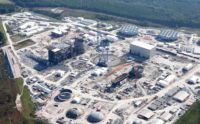It was a contract legal dispute that began in the mid-1990s over a project that started a decade earlier to build a subway line that was completed in 2000. But in a key ruling, a California appeals court panel on Feb. 26 reversed a lower court’s earlier award of $93 million to the Los Angeles Metropolitan Transit Authority—siding with a Parsons Corp.-led team that it did not overcharge the agency or breach contract terms in managing construction of the city’s Red Line. In a separate ruling, the judges affirmed the trial court’s earlier decision to reject MTA’s false-claim allegations against the Parsons-Dillingham joint venture, in what one case attorney said was the longest-running suit in U.S. history under the federal false-claims law.
The ruling vindicates Parsons, Phyllis Kupferstein, the firm’s outside attorney, told ENR. “There was no fraud, no false claim and no breach of contract,” she said. “It’s been a very long road. We are delighted the appeals court agreed with our interpretation of the contract.” An MTA spokesman said the agency does not comment on pending litigation. It has 10 days to appeal after the panel ruling becomes final on March 26.
Under a contract dating to 1984 and amended several times, the team was paid $365 million on 2004 final invoices for work on the project. The 16.4-mile line, which runs from downtown to North Hollywood, was finished in stages between 1993 and 2000.
The seemingly unending legal battle began in 1994, when a former Parsons financial manager, Martin Gerlinger, filed state and federal whistle-blower suits, alleging the overbilling and false claims. MTA joined the litigation in 1996. There were 100 days of trial. The suits were assigned to three different judges before the $93-million judgment was entered in favor of MTA in 2014, which included about $30 million for improperly billed overhead charges by the contractors and $25 million for unauthorized subcontractor costs.
An earlier trial court ruling in 2009 found that most of Parsons’ billed costs were ineligible, concluding that they were not “reasonably incurred by Parsons exclusively in connection with the performance of services” under the contract.
The court said the firm could not allocate to the Red Line project a proportionate share of general expenses. Parsons appealed the ruling, disputing the court’s interpretation of the contract. The three-member appeals panel agreed with Parsons, contending that the trial court decision “misunderstood the plain meaning of the parties’ agreement” and termed its interpretation “erroneous.” But the panel agreed with the trial court that Parsons was not entitled to recover $9 million in added subcontractor costs based on submittal errors.
“It is unfortunate that the Los Angeles Metropolitan Transportation Authority has elected to spend tens of millions of taxpayer dollars to pursue claims that were contrary to the terms of its contract with Parsons and that have been rightfully rejected by the appellate court,” says Erin Kuhlman, a Parsons spokeswoman. She says the contractor completed the Red Line on time and with minimal change orders.
Louis J. Cohen, an attorney for Gerlinger, told ENR that he and MTA will petition the appeals court for a rehearing, a requirement before the state’s high court can take the case and “to give the appeals court an opportunity to correct its errors.” According to Cohen, “contractors were playing catch me if you can with the MTA.”






Post a comment to this article
Report Abusive Comment